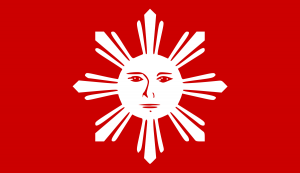Language/Tagalog/Vocabulary/Law-and-Justice
Introduction[edit | edit source]
Welcome to the "Tagalog Vocabulary → Advanced Vocabulary → Law and Justice" lesson! In this lesson, we will delve into the world of legal and judicial terms in Tagalog. By expanding your vocabulary in this area, you will be able to better understand and discuss topics related to law and justice in the Philippines. Whether you are interested in the legal system, studying law, or simply want to enhance your language skills, this lesson is designed to provide you with the necessary tools to navigate legal terminology in Tagalog.
Throughout this comprehensive lesson, we will cover a wide range of legal and judicial terms, including the names of different crimes, legal procedures, and court-related jargon. We will also explore the cultural and historical aspects of the Filipino legal system, providing you with a deeper understanding of the topic. By the end of this lesson, you will have a solid foundation of advanced legal vocabulary and be well-equipped to discuss legal matters in Tagalog.
Law and Justice in the Philippines[edit | edit source]
The legal system in the Philippines is based on a combination of civil law and common law principles. It draws heavily from Spanish and American legal traditions due to the country's colonial history. The main body of laws in the Philippines is the Civil Code, which covers a wide range of legal matters, including contracts, property rights, family law, and more. Additionally, the country has a separate criminal code that outlines criminal offenses and their corresponding penalties.
The Philippine legal system operates on the principle of the rule of law, with an independent judiciary responsible for interpreting and applying the law. The Supreme Court is the highest judicial authority in the country, and its decisions serve as binding precedents for lower courts. The court system includes trial courts, appellate courts, and the Supreme Court, each with its own jurisdiction and responsibilities.
Legal and Judicial Terms[edit | edit source]
Now let's dive into the advanced legal and judicial terms in Tagalog. We will begin by exploring the names of different crimes, legal procedures, and court-related jargon.
Crimes and Offenses[edit | edit source]
In Tagalog, there are specific terms for various crimes and offenses. Here are some examples:
| Tagalog | Pronunciation | English Translation |
|---|---|---|
| Pagnanakaw | /pɑŋ.nɑ.nɑ.kɑw/ | Theft |
| Pagsasamantala | /pɑg.sɑ.sɑ.mɑn.tɑ.lɑ/ | Exploitation |
| Panloloko | /pɑn.lo.lo.ko/ | Fraud |
| Pananakit | /pɑ.nɑ.nɑ.kɛt/ | Physical Assault |
| Pagsisinungaling | /pɑg.sɪ.sɪ.nʊŋ.ɑ.lɪŋ/ | Perjury |
Legal Procedures[edit | edit source]
When it comes to legal procedures, there are specific terms that are commonly used. Here are some examples:
| Tagalog | Pronunciation | English Translation |
|---|---|---|
| Demandahan | /dɛ.mɑn.dɑ.hɑn/ | Lawsuit |
| Testigo | /tɛs.ti.gɔ/ | Witness |
| Hukom | /hu.kɔm/ | Judge |
| Abogado | /ɑ.bo.gɑ.dɔ/ | Lawyer |
| Parusa | /pɑ.ru.sɑ/ | Punishment |
[edit | edit source]
Understanding court-related jargon is essential for discussing legal matters. Here are some important terms:
| Tagalog | Pronunciation | English Translation |
|---|---|---|
| Korte | /kɔr.tɛ/ | Court |
| Kaso | /kɑ.sɔ/ | Case |
| Desisyon | /dɛ.sɪ.sjɔn/ | Decision |
| Apela | /ɑ.pɛ.lɑ/ | Appeal |
| Saksi | /sɑk.si/ | Witness |
Cultural Insights[edit | edit source]
The Philippines has a unique legal system with its own cultural nuances. The influence of Spanish and American legal traditions can be seen in the legal terminology and practices. Additionally, the Filipino legal system places a strong emphasis on the concept of "pakikisama" or social harmony, which often influences the resolution of legal disputes. Mediation and reconciliation are common alternatives to litigation, reflecting the country's collectivist culture.
Historically, the Philippines has also had a unique legal institution called the "barangay justice system." The barangay is the smallest administrative division in the country, and the barangay justice system allows for the resolution of minor disputes at the community level. This system aims to promote quick and accessible justice, rooted in the principles of restorative justice and community involvement.
Exercises[edit | edit source]
Now it's time to put your knowledge to the test with some exercises! Practice using the legal and judicial terms you've learned in Tagalog sentences or scenarios. Here are a few examples:
1. Translate the following sentence into Tagalog: "The accused was found guilty of theft." 2. Imagine you are in a courtroom. Write a short dialogue between a lawyer and a witness, incorporating the legal and judicial terms you've learned. 3. Fill in the blank with the correct legal term: "The ___________ has the authority to interpret and apply the law."
Solutions[edit | edit source]
Here are the solutions to the exercises:
1. "Nakumpiska ang akusado sa pagnanakaw." 2. Lawyer: "Testigo, ito ba ang unang pagkakataon na nakita mo ang akusado na pagnanakaw?" Witness: "Oo, abogado." (Lawyer: "Witness, is this the first time you saw the accused committing theft?" Witness: "Yes, lawyer.") 3. "Ang hukom ang may kapangyarihang magpaliwanag at ipatupad ang batas."
By completing these exercises, you have further reinforced your understanding of legal and judicial terms in Tagalog.
Conclusion[edit | edit source]
Congratulations on completing the "Tagalog Vocabulary → Advanced Vocabulary → Law and Justice" lesson! You have expanded your vocabulary in the field of law and justice, enabling you to discuss legal matters in Tagalog with confidence. Remember to practice using these terms in real-life situations to further solidify your knowledge.
In the next lesson, we will explore another exciting topic in advanced Tagalog vocabulary. Stay tuned and continue your journey to becoming a proficient Tagalog speaker!
Other Lessons[edit | edit source]
- Directions and Transportation
- Family Members and Relationships
- How to say Good Bye?
- Idiomatic Expressions
- Education and Learning
- How to Say Hello and Greetings
- Numbers and Counting
- Days of the Week
- Animals
- Food

